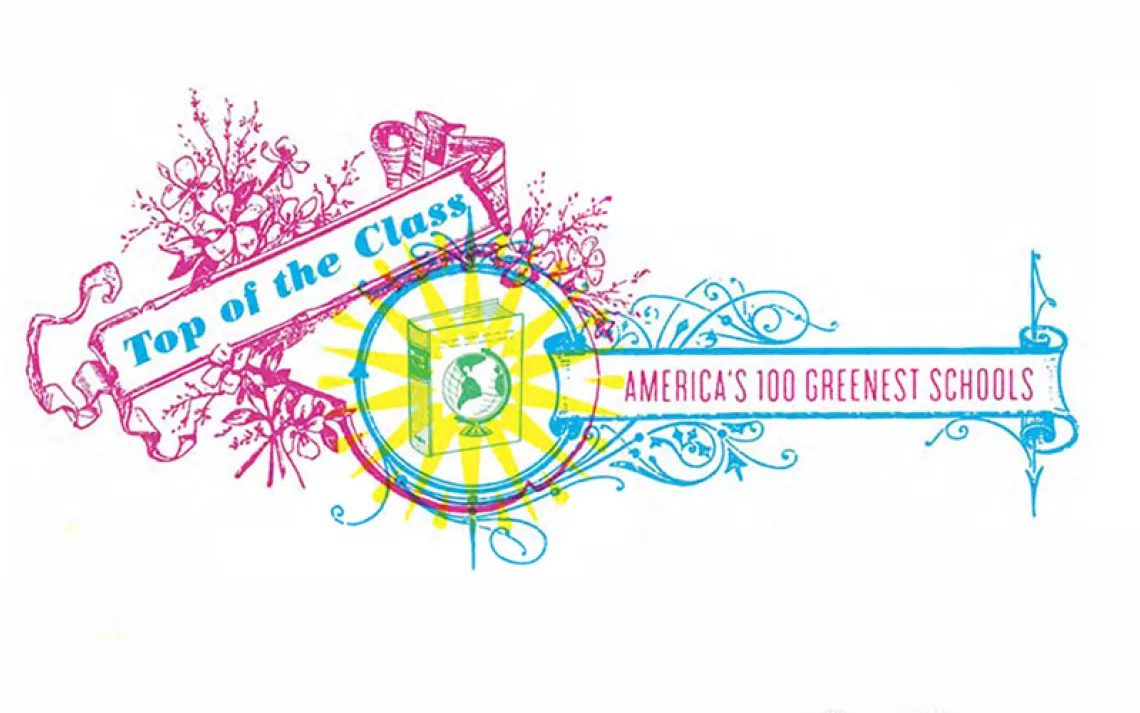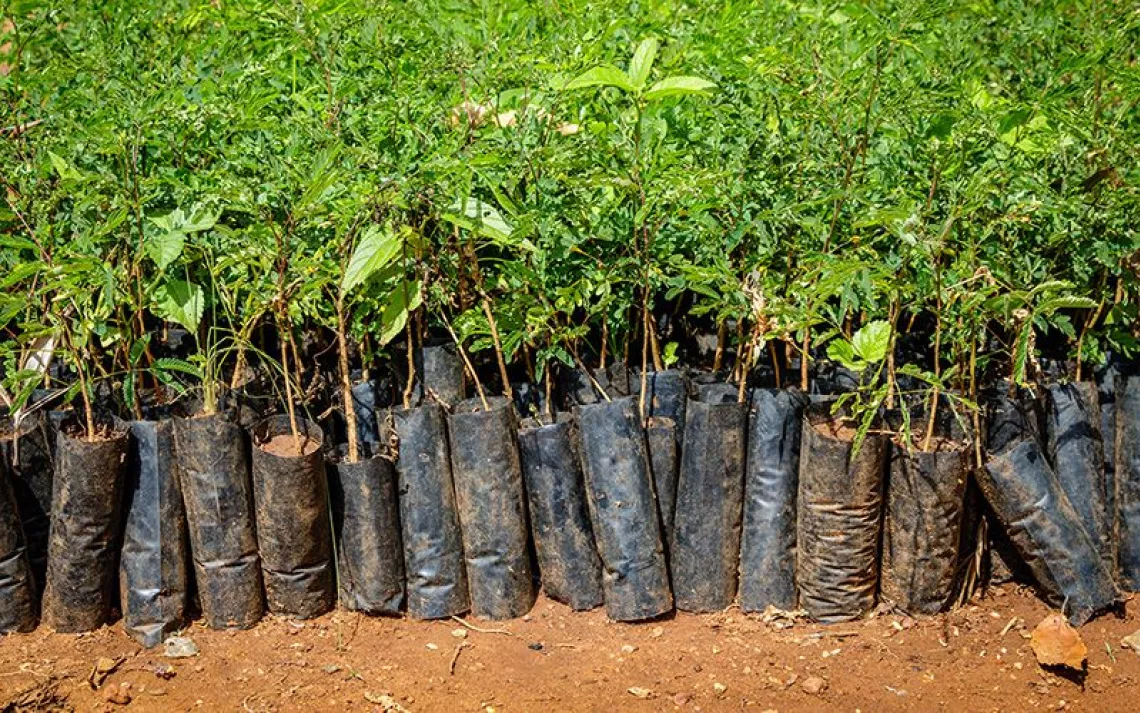Students' Aha Moments
How a professor, a class, even a PowerPoint presentation can change a life
Derek Chung
Environmental Engineering, UCSD '12

Derek Chung helped start the University of California, San Diego chapter of Engineers for a Sustainable World. | Photo courtesy of Claire Groebner
"When I started college, I thought global warming was stupid, trees needed to be cut down, and everything ran on the guiding hand of the market," Derek Chung says. The 23-year-old with mussed-up hair is Skyping from a hostel in Malaysia, the 16th country he's passed through during an eight-month "soul search."
By his sophomore year at the University of California, San Diego, Chung had helped found his campus's chapter of Engineers for a Sustainable World. But, he says, he initially got involved with the club to pad his resume, "not really to make a sustainable world."
What truly sparked his interest in sustainability was a sophomore-year engineering class whose name he now forgets. (Nor does the class's professor, Sarah Gille, remember Chung. The 200-student Environmental Challenges course "runs the risk of being pretty impersonal," she admits.)
What Chung does remember is the course's term paper, for which he assessed a cow's environmental impact from birth to death. In it, Chung focused on the economics of beef production and concluded that "grass-fed beef is environmentally sustainable but not economically practical." He explains what he learned from that paper in terms of water: Producing a pound of beef requires about 1,800 gallons.
Though Chung grew up in the suburbs of Los Angeles, the mention of water takes him back to the Grand Canyon, where he vacationed with his family every summer from ages 5 to 14. There, bluegills and guppies nibbled his toes, and baby rattlesnakes eyed him from between boulders. Through the years, he watched the canyon change. Water levels fell. "There used to be thousands of little critters hopping around [the waterfalls], but in later years we either didn't find them or they just weren't there."
When he considered the water footprint of one cow, then scaled that number up to 33 million, which is the number of cows killed in the United States each year, he began to worry: "Maybe the changes are our fault."
After making that calculation, Chung gradually reinvented his lifestyle--though it wasn't all the cows' doing. As he became more active in Engineers for a Sustainable World, he met "people who were so passionate about sustainability that their passion was addictive." He also started dating a vegan.
For most of his life, Chung had eaten meat with every meal. His junior year, he experimented with veganism for two months ("It was really hard"), then went back to eating meat, but only a few times a week. Next he started biking to class--three miles each way. Then he stopped buying new stuff. "It's really lovely and freeing to feel like I don't need any new thing," he says in the midst of crossing two continents with fewer than 12 pounds of possessions.
Later this summer, Chung will meet four fellow Engineers for a Sustainable World members in Thailand to install a student-designed project. The team's hydroelectric generator will power a UV filter to provide 150 families with 720 gallons of clean water per hour.
Sometime after that, Chung will head home, and then he'll . . . he doesn't yet know.
{C}
Sarah Brylinsky Communications Management and Design, Ithaca College '08

Sarah Brylinsky directs climate programs at the nonprofit Second Nature.
A couple of months into a freshman seminar, Sarah Brylinsky sat through a PowerPoint presentation. It wasn't much more than a series of line charts from a 2001 Intergovernmental Panel on Climate Change report. But the charts had pluck. Their lines were fire engine red, and they rose fervently up, up, following the perilous trajectory of greenhouse gas concentrations and surface temperatures. The final slide was just a quote from David A. King, the former chief scientific adviser to the British government: "In my view, climate change is the most severe problem that we are facing today--more serious even than the threat of terrorism."
Eight years later, Brylinsky reflects on that presentation with the same intensity she felt back then: "That day, I had this realization that if I couldn't devote myself to ensuring that there would be a world in which I could play my music, then it really wasn't worth making music at all."
Brylinsky had arrived at Ithaca College, in New York, intending to be a music major, alto saxophone in tow. Her first semester, she happened into that seminar, which had a name as big as its scope: Sustaining Our Worlds: Connecting People, Prosperity, and Our Planet. Because she had registered for classes late, seminars that sounded more interesting to her--like War, Sex, and Machinery Throughout the Ages--were already full.
The class she ended up in was led by four instructors from three departments: economics, chemistry, and sociology. The goal, according to James Rothenberg, the sociology professor, wasn't just to teach sustainability but also to encourage students to make cross-disciplinary connections. "No one of these disciplines has the answer [to the climate crisis]," Rothenberg says. "The distinctions between these subjects are really artificial, just a creation of western academia."
Brylinsky went on to study with the seminar's business instructor, David Saiia; together, they promoted sustainable business practices in Ecuador. Nevertheless, she chose not to pursue a degree in business or in science. "I didn't feel called to be a scientist," she says. "I felt that what we really needed was people to communicate the science effectively."
Brylinsky graduated with a degree in communications management and design. She now lives in Boston, where she hauls her groceries by bike trailer, plays the sax for fun, and was recently promoted to be the director of climate resilience and education programs at Second Nature, a nonprofit that makes higher education more sustainable. She's proudest of her work with the American College and University Presidents' Climate Commitment, wherein 700 schools have promised to pursue climate neutrality on campus. Since 2007, its signatories have collectively reduced their CO2 emissions by 25 percent--and they offer a total of nearly 10,000 courses focused on sustainability--some of which feature PowerPoints.
{C}
Sharon Matola
Biology, New College of Florida '81

Sharon Matola with a barn owl at the zoo she founded in Belize. | Photo courtesy of Randy and Kathy Cross
In the tropical savanna of Belize, in a stone house, there lives a woman with an owl and a crocodile. The woman's forearms are crosshatched with jaguar and puma claw scars; sometimes she wears snakeskin-patterned Lycra pants. At least one government official refers to the woman as an "enemy of the people" for her anti-dam activism. At least one Belizean citizen calls the woman "our Joan of Arc" for her conservation work. The 12,000 children who visit the woman every year know her as "Zoo Lady" because Sharon Matola is the woman who, in 1983, founded Belize's only zoo for orphaned animals.
Before Matola's life came to resemble a modern fairy tale, the Maryland native was once 24 and restless in Iowa City. Disenchanted with her marriage to a dentist and failing a chemistry class at the University of Iowa, she fled south in 1978, ending up in the biology program at the New College of Florida. There, she failed another chemistry class and was intimidated by her peers--"all brainiacs." There she also met cell biologist John B. Morrill. He intimidated her too.
Everyone was a little afraid of JBM. (That's what people called him, given his habit of labeling his belongings, from microscopes to rulers, "Hands off! JBM.") He was tall, thin, and muscular, witty and biting. Matola recalls his advice about change (pertaining to careers, relationships, and all other matters) as a dark spin on a familiar maxim: "The grass always gets brown."
Morrill funded the college's cell biology program with his own money. He also inspired undergrads to consume stacks of scientific literature outside class and to watch sea urchins multiply through a microscope for 24 consecutive hours. New College chemistry professor Paul Scudder says, "He really took an interest in every single student."
One hot day, he showed Matola how oysters collect on the aboveground roots of red mangroves. From the trees' yellowed leaves, he made tea. Tugging at droopy seedpods, he said that they made fine cigars. Matola was awed by his knowledge. She had already noticed his passion in the lab, where "it was like all the cells were his friends." Watching Morrill in the wild set her on fire.
That day in the mangroves, Morrill said something to the effect of "You know, there's enough food here to survive off this land." Matola took the comment as a challenge. To fulfill the school's independent-study requirement, she and a classmate paddled out to a deserted island, bringing no food. For five days, they subsisted on coconuts and the fleshy leaves of sea purslane. She lost a bit of weight, she recalls, but says, "I loved that trip. It awakened in me some self-confidence."
Matola does not remember the name of that "tiny speck of an island," or even the name of the classmate who accompanied her there. She can't ask Morrill because he died in 2010. But this Matola recalls with certainty: "JBM told me I was smart. He was the only professor who said that."
After graduating with a biology degree, Matola planned to go to grad school but decided instead to swim the channel near the Rio Grande with a spider monkey under her jacket. To join a Mexican circus. To work as an animal caretaker for a documentarian. When she got stuck in Belize with 20 animals too domesticated to survive alone in the jungle--an ocelot, a puma, and a jaguar among them--Matola painted and nailed up a wooden sign: THE BELIZE ZOO.
At 59, Matola makes time for up-and-comers. "I laugh inside when these kids--usually college students teetering on uncertainty--are intimidated by me, as if I'm some superhuman hero. I try to get on their level and share what I can share."
![]()
![]()
 The Magazine of The Sierra Club
The Magazine of The Sierra Club






